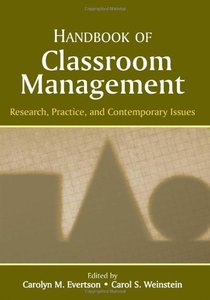Handbook of Classroom ManagementResearch, Practice, and Contemporary Issues
|

|
 Diese Seite wurde seit 2 Jahren inhaltlich nicht mehr aktualisiert.
Unter Umständen ist sie nicht mehr aktuell.
Diese Seite wurde seit 2 Jahren inhaltlich nicht mehr aktualisiert.
Unter Umständen ist sie nicht mehr aktuell.
 Zusammenfassungen
Zusammenfassungen
 Classroom management is a topic of enduring concern for teachers, administrators, and the public. It consistently ranks as the first or second most serious educational problem in the eyes of the general public, and beginning teachers consistently rank it as their most pressing concern during their early teaching years. Management problems continue to be a major cause of teacher burnout and job dissatisfaction. Strangely, despite this enduring concern on the part of educators and the public, few researchers have chosen to focus on classroom management or to identify themselves with this critical field. "The Handbook of Classroom Management" has four primary goals: to clarify the term classroom management; to demonstrate to scholars and practitioners that there is a distinct body of knowledge that directly addresses teachers' managerial tasks; to bring together disparate lines of research and encourage conversations across different areas of inquiry; and to promote a vigorous agenda for future research in this area. To this end, 47 chapters have been organized into 10 sections, each chapter written by a recognized expert in that area.
Classroom management is a topic of enduring concern for teachers, administrators, and the public. It consistently ranks as the first or second most serious educational problem in the eyes of the general public, and beginning teachers consistently rank it as their most pressing concern during their early teaching years. Management problems continue to be a major cause of teacher burnout and job dissatisfaction. Strangely, despite this enduring concern on the part of educators and the public, few researchers have chosen to focus on classroom management or to identify themselves with this critical field. "The Handbook of Classroom Management" has four primary goals: to clarify the term classroom management; to demonstrate to scholars and practitioners that there is a distinct body of knowledge that directly addresses teachers' managerial tasks; to bring together disparate lines of research and encourage conversations across different areas of inquiry; and to promote a vigorous agenda for future research in this area. To this end, 47 chapters have been organized into 10 sections, each chapter written by a recognized expert in that area.
Cutting across the sections and chapters are the following themes: first, positive teacher-student relationships are seen as the very core of effective classroom management; second, classroom management is viewed as a social and moral curriculum; third, external reward and punishment strategies are not seen as optimal for promoting academic and social-emotional growth and self-regulated behavior; and, fourth, to create orderly, productive environments teachers must take into account student characteristics such as age, developmental level, race, ethnicity, cultural background, socioeconomic status, and ableness. Like other research handbooks, "the Handbook of Classroom Management" provides an indispensable reference volume for scholars, teacher educators, in-service practitioners, and the academic libraries serving these audiences. It is also appropriate for graduate courses wholly or partly devoted to the study of classroom management.
 Dieses Buch erwähnt ...
Dieses Buch erwähnt ...
 Begriffe KB IB clear | Curriculum / Lehrplancurriculum
,  LehrerIn LehrerIn teacher
, teacher
,  Schule Schule school school
|
 Dieses Buch erwähnt vermutlich nicht ...
Dieses Buch erwähnt vermutlich nicht ... 
 Nicht erwähnte Begriffe | Bildung, Digitalisierung, Kinder, Lehrplan 21, Lernen, Schweiz, Unterricht |
 Tagcloud
Tagcloud
 Zitationsgraph
Zitationsgraph
 Zitationsgraph (Beta-Test mit vis.js)
Zitationsgraph (Beta-Test mit vis.js)
 7 Erwähnungen
7 Erwähnungen 
- Visible Learning and the Science of How We Learn (John Hattie, Gregory C. R. Yates) (2013)

- One-to-One Computing and Student Achievement in Ohio High Schools (Nancy L. Williams, Karen H. Larwin) (2016)
- What Every Teacher Needs to Know About Psychology (David Didau, Nick Rose) (2016)

- Digital Diversity - Bildung und Lernen im Kontext gesellschaftlicher Transformationen (Holger Angenent, Birte Heidkamp, David Kergel) (2019)


- Inszenierte Unterrichtsvideovignetten zur Förderung des Wissens um Klassenführung von (angehenden) Lehrkräften (Julia Bönte, Gerlinde Lenske, Theresa Dicke, Detlev Leutner)


- Inszenierte Unterrichtsvideovignetten zur Förderung des Wissens um Klassenführung von (angehenden) Lehrkräften (Julia Bönte, Gerlinde Lenske, Theresa Dicke, Detlev Leutner)
- The Datafication of Education (Juliane Jarke, Andreas Breiter) (2019)
- 3. The datafication of discipline - ClassDojo, surveillance and a performative classroom culture (Jamie Manolev, Anna Sullivan, Roger Slee) (2018)


- 3. The datafication of discipline - ClassDojo, surveillance and a performative classroom culture (Jamie Manolev, Anna Sullivan, Roger Slee) (2018)
- Orientierungen in der digitalen Welt (Bardo Herzig, Tilman-Mathies Klar, Alexander Martin, Dorothee M. Meister) (2020)


- Lehrkräftegewinnung und Lehrkräftebildung für einen hochwertigen Unterricht (SWK Ständige Wissenschaftliche Kommission der KMK) (2023)


 Co-zitierte Bücher
Co-zitierte Bücher
 Volltext dieses Dokuments
Volltext dieses Dokuments
 Bibliographisches
Bibliographisches 
 Beat und dieses Buch
Beat und dieses Buch
Beat hat dieses Buch während seiner Zeit am Institut für Medien und Schule (IMS) ins Biblionetz aufgenommen. Beat besitzt kein physisches, aber ein digitales Exemplar. (das er aber aus Urheberrechtsgründen nicht einfach weitergeben darf). Aufgrund der wenigen Einträge im Biblionetz scheint er es nicht wirklich gelesen zu haben. Es gibt bisher auch nur wenige Objekte im Biblionetz, die dieses Werk zitieren.










 , 7304 kByte)
, 7304 kByte) 



 Biblionetz-History
Biblionetz-History